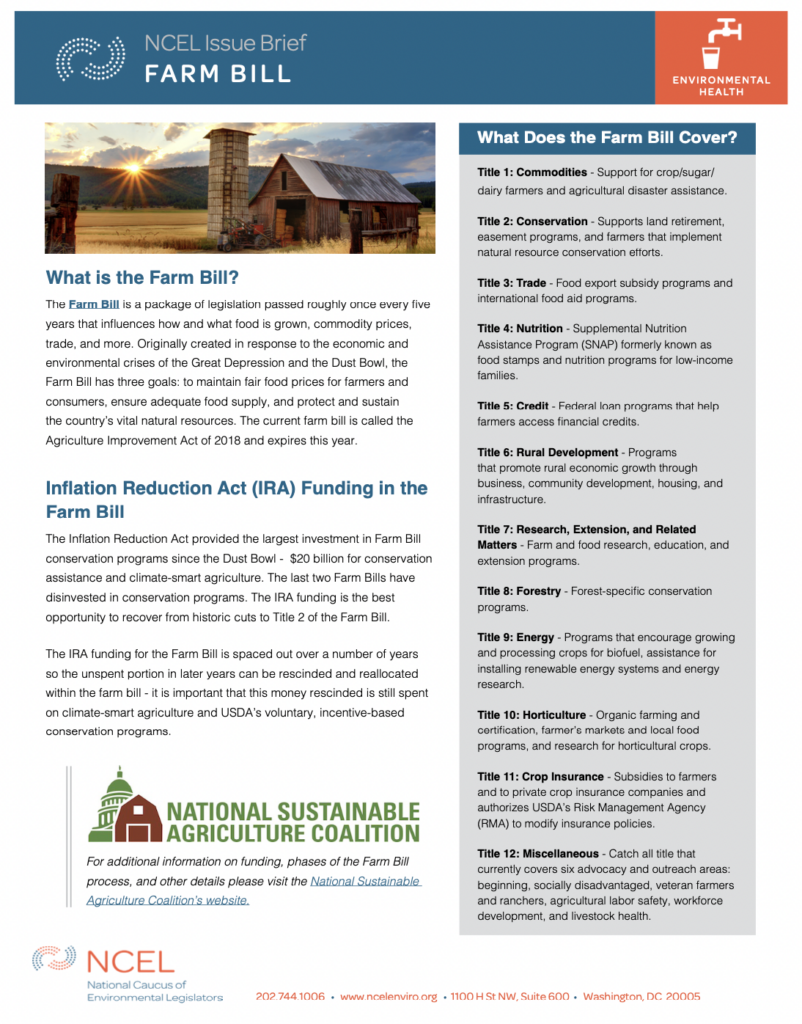
Issue Brief
Farm Bill
Overview
This Issue Brief is intended to give an overview of the Farm Bill, a package of legislation that influences how and what food is grown, commodity prices, trade, and more. The full Issue Brief includes the Inflation Reduction Act's (IRA) funding for the Farm Bill and more information about what areas the Farm Bill covers.

What is the Farm Bill?
The Farm Bill is a package of legislation passed roughly once every five years that influences how and what food is grown, commodity prices, trade, and more. Originally created in response to the economic and environmental crises of the Great Depression and the Dust Bowl, the Farm Bill has three goals: to maintain fair food prices for farmers and consumers, ensure adequate food supply, and protect and sustain the country’s vital natural resources. The current farm bill is called the Agriculture Improvement Act of 2018 and expires this year.
Inflation Reduction Act (IRA) Funding in the Farm Bill
The Inflation Reduction Act provided the largest investment in Farm Bill conservation programs since the Dust Bowl – $20 billion for conservation assistance and climate-smart agriculture. The last two Farm Bills have disinvested in conservation programs. The IRA funding is the best opportunity to recover from historic cuts to Title 2 of the Farm Bill.
The IRA funding for the Farm Bill is spaced out over a number of years so the unspent portion in later years can be rescinded and reallocated within the farm bill – it is important that this money rescinded is still spent on climate-smart agriculture and USDA’s voluntary, incentive-based conservation programs.
What Does the Farm Bill Cover?
- Title 1: Commodities – Support for crop/sugar/dairy farmers and agricultural disaster assistance.
- Title 2: Conservation – Supports land retirement, easement programs, and farmers that implement natural resource conservation efforts.
- Title 3: Trade – Food export subsidy programs and international food aid programs.
- Title 4: Nutrition – Supplemental Nutrition Assistance Program (SNAP) formerly known as food stamps and nutrition programs for low-income families.
- Title 5: Credit – Federal loan programs that help farmers access financial credits.
- Title 6: Rural Development – Programs that promote rural economic growth through business, community development, housing, and infrastructure.
- Title 7: Research, Extension, and Related Matters – Farm and food research, education, and extension programs.
- Title 8: Forestry – Forest-specific conservation programs.
- Title 9: Energy – Programs that encourage growing and processing crops for biofuel, assistance for installing renewable energy systems and energy research.
- Title 10: Horticulture – Organic farming and certification, farmer’s markets and local food programs, and research for horticultural crops.
- Title 11: Crop Insurance – Subsidies to farmers and to private crop insurance companies and authorizes USDA’s Risk Management Agency (RMA) to modify insurance policies.
- Title 12: Miscellaneous – Catch all title that currently covers six advocacy and outreach areas: beginning, socially disadvantaged, veteran farmers and ranchers, agricultural labor safety, workforce development, and livestock health.
For additional information on funding, phases of the Farm Bill process, and other details please visit the National Sustainable Agriculture Coalition’s website.

Empower State Environmental Champions
Your donation funds the fight for equitable actions that protect the environment and our health.
Donate